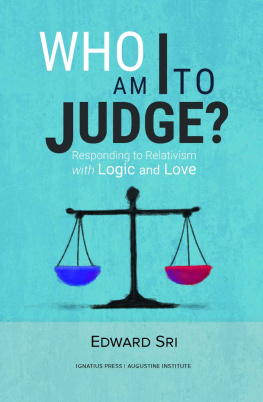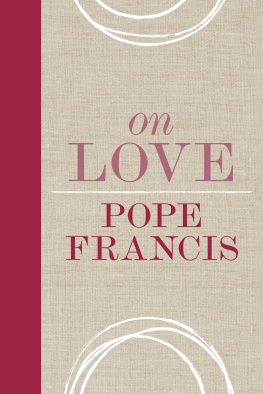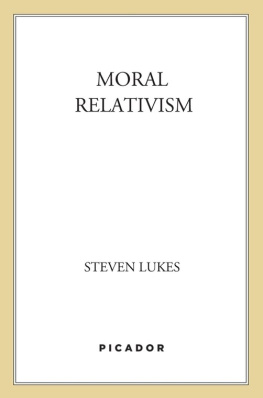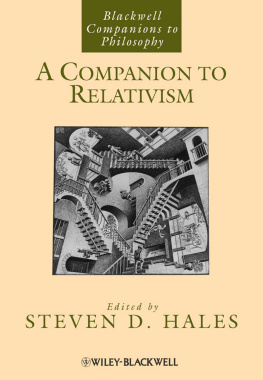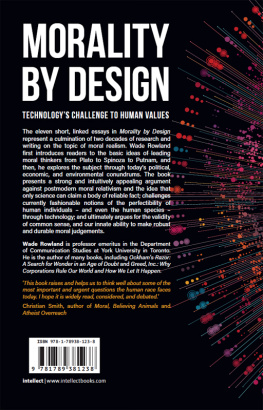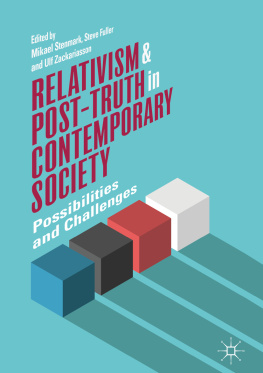Who Am I to Judge?
Who Am I to Judge?
Responding to Relativism
with Logic and Love
By Edward Sri
Ignatius Press Augustine Institute
San Francisco Greenwood Village, CO
Ignatius Press Distribution
P.O. Box 1339
Fort Collins, CO 80522
Tel: (800) 651-1531
www.ignatius.com
Augustine Institute
6160 S. Syracuse Way, Suite 310
Greenwood Village, CO 80111
Tel: (866) 767-3155
www.augustineinstitute.org
Unless otherwise noted, Scripture quotations are from
Revised Standard Version of the Bible
Second Catholic Edition (Ignatius Edition)
Copyright 2006 National Council of the Churches of Christ in the
United States of America.
Used by permission. All rights reserved worldwide.
Cover Design: Enrique J. Aguilar Pinto
2016 by Ignatius Press, San Francisco,
and the Augustine Institute, Greenwood Village, CO
All rights reserved.
ISBN: 978-1-62164-165-0 (PB)
ISBN: 978-1-68149-744-0 (EB)
Library of Congress Control Number 2016955378
Printed in Canada
To my daughter Elinor
Contents
PART ONE:
THE CHALLENGE
PART TWO:
A NEW VISION
PART THREE:
SEVEN KEYS FOR RESPONDING
TO RELATIVISM
Preface
Sixty-five college students every Monday, Wednesday, and Friday. Most of them dont want to be there. How do I present the Christian moral tradition in a way that is captivating and compelling to these young peopleespecially when so many of them think of morality as a bunch of arbitrary rules from religion, assume each individual should be free to make up his own morality, and balk at the slightest hint that someone might be trying to tell them what to do?
This is what I was pondering while preparing to teach a course called Christian Moral Life at a small Catholic college in Kansas many years ago.
I understood where they were coming from, for I had been there myself at one time. When starting college, I had many questions about Catholic moral teachings regarding life, sex, and marriage. And the secular environment on campus regularly challenged traditional moral values. Anyone daring to claim that some behavior was morally right or wrong was typically accused of being judgmental and intolerant: Who do Christians think they are to tell other people how to live? Dont judge others just because they have different values and different lifestyles. Dont impose your morality on me! In the face of such opposition, I was not always sure how to respond.
Over time, thankfully, through good friends, mentors, teachers, priests, and books, I eventually came to see more clearly the beauty of the Catholic moral vision. It makes sense out of life. It points to what makes us truly happy. It shows us the pathway to virtue, friendship, and lasting love. It also encourages us to face the truth about ourselvesour faults, our weaknesses, our sinsin light of the truth about Gods unwavering love for us. It thus leads us to a profound encounter with Christs mercy and to a power that enables us to live and love in a way we could never do on our own: the power of Gods grace. Indeed, the Christian moral life is the pathway to human flourishing. Only by living the way God intended for us, by living in union with Christ, can our hearts deepest desires be fulfilled.
But thats not the average persons impression of Catholic morality and certainly not that of the majority of college students I was preparing to teach. Most had been shaped by the cultures individualistic outlook on life and came with the presupposition of moral relativism. For them, morality was just personal opinion. Each individual makes up his own truth. Each decides for himself what is right or wrong. The one really bad thing to do in life is to make a judgment about someone elses moral beliefs. That would be intolerant.
Much of this book draws on years of teaching about the problem of moral relativism to college students and young adults throughout the country. I am thankful to so many of them for their sincere questions and honest dialogue about the moral issues they face. Countless insights from those conversations have, no doubt, left their mark on the pages of this book. I am also thankful for the many young people of all sorts of backgroundsCatholic, Protestant, non-Christian, agnostic, and even atheistwho were open to an alternative way of looking at life, very different from what the secular, relativistic world offers and whose lives were significantly changed as a result. I pray that this short, simple work may touch your life as well, as it introduces some key features of a Catholic moral worldview and offers practical keys for talking about morality with your relativistic friends.
Edward Sri
October 22, 2016
Memorial of Pope St. John Paul II
PART ONE
THE CHALLENGE
Chapter One
A New Kind of Intolerance
So how did you respond to that question about gay marriage?
Thats the simple question Kara was asked by a friend on the way out of class her freshman year at college. She was taking a political science course at a big state university when her professor passed out a survey about moral beliefs and politics. One of the questions was about gay marriage.
I said I was against it, she said.
Kara grew up in a Catholic family, went to youth group as a teenager, and continued practicing her faith in college, going to Mass every Sunday on campus. Her faith was important to her, and she held traditional values about marriage and family.
Well, I said I was for it! her friend replied.
Unlike Kara, he believed each individual should be free to make up his own morality and decide for himself what marriage is. But he shrugged off Karas seemingly antiquated beliefs and went his way, saying, To each his own.... See you at the party tonight! Despite the difference of opinion, all seemed to remain peaceful between the two friendsuntil Kara showed up at the party.
As soon as she entered the room, her friend stood up and shouted to get everyones attention. Hey, everybody!... Guess what Kara said about gay marriage in class today? She said she was against it! Can you believe that? Shes against gay marriage!
Suddenly, Kara found herself on trial, surrounded by dozens of her peers berating her: How could you say that? Who are you to decide what marriage is for everyone else? Why are you so intolerant?... You shouldnt impose your views on other people. She tried to explain her position. But it only made things worse. Some even called her a bigot and a gay hater. In the end, the only thing she could do was walk away and leave.
Devastated, Kara left that party changed. She had never taken such a thrashing for her faith before. She pondered whether it was worth it all. I dont know if I want to stand up for my beliefs like this again, she told herself. It costs way too much.
Understandably, Kara wanted to fit in, be accepted, and be liked by her friends. But I learned that day, she later reflected, that if I stand up for what I believe, I would suffer a lot for it. And I didnt think I had it in me to take another beating like that again. Thats when Kara started becoming a relativistat least in her heart. At first, the change was subtle. She still held the same moral convictions about abortion, marriage, and sex, but with a new, two-word qualification: For me. When hot-button moral issues would come up in conversation, she would say to her friends, Well, for me abortion is wrong.... I would never have an abortion. But if other people think abortion is okay, thats fine for them. Or: For me marriage is between a man and a woman, but if someone else thinks differently, then thats okay for them, if thats what makes them happy.
_____________________________
She still held the same moral convictions about abortion, marriage, and sex, but with a new, two-word qualification: For me.
Next page
